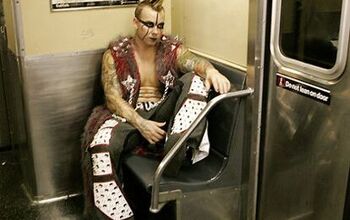2 Views
Big Apple Congestion Charging: Act Now, Think Later
by
Robert Farago
(IC: employee)
Published: July 14th, 2007
Share
Congestion charging has been a fact of life in London since February 17, 2003. And now, New York City wants some of those extra tax revenues environmental benefits. Mayor Bloomberg’s hopes for a congestion charge currently face a tight deadline. As Newsday explains, if the New York State Senate enacts a bill clearing the way for a congestion charge on Monday, the city scores a $500m federal grant for its implementation. If not, not. To get it done, Mayor Bloomberg’s Albany shock troops have drafted an “act now, think later” bill. If passed, a 12-member commission will develop recommendations for putting an unspecified congestion charging plan in effect. Now that's what we call forward thinking!
Robert Farago
More by Robert Farago
Published July 14th, 2007 5:31 PM


































Comments
Join the conversation
This has kind of veered off into a somewhat philosophical discussion, so as a New Yorker, let me bring it back to local issues. IMHO, all of the fears of this being highly regressive are misplaced. There is almost no legal street parking in Manhattan, and the amount available during business hours has been steadily declining in the 8 years that I have lived here. Drivers who come in during business hours typically pay anywhere from $20 (if they have a monthly spot) to $50 per day, plus 18% tax. This does not include the round trip tolls you must pay to come in from anywhere besides a handful of inter-borough bridges. We're not talking about low-income workers who will be affected; the typical driver is a professional from New Jersey, Long Island, Connecticut or Westchester. Also, tourists rarely drive into Manhattan. They (correctly) take advantage of air, rail and bus access. Most non-residents I meet are terrified of driving in Manhattan and will actually pay good money to avoid it. There are only a few of outer-borough communities that are basically "off" the subway system now. Reduced traffic will benefit them, not hurt them, by making express bus service a viable transit option. Low income workers from these areas do not drive into Manhattan currently. They endure long local bus journeys to remote subway outposts, and then ride 45 minutes or more to get to Manhattan. Expanded express bus service would be a huge boon to these areas. Finally, drivers coming into Manhattan limit airport access. We have 3 major airports around New York City, but only one of them (Newark) can be conveniently reached by train. Getting to JFK is particularly bad during peak times because the only viable route is via the Long Island Expressway, where one must share the road with countless single-passenger vehicles (usually German) inching their way home. Given the quality of mass transit available from Long Island, it makes me wonder if they are driving simply to make their commute take as long as possible because they secretly hate their lives. It's an absurd state of affairs. My only beef with the plan is that I don't think the charge is high enough, given the already high cost of parking and tolls. I believe $50 per day is probably the appropriate level, personally. The truth of the matter is that most people who drive into Manhattan have displayed so much price inelasticity that I don't think anything less will make much of a difference.
Btw, the "German" comment in my post above in intended to indicate driver income demographics on the LIE (i.e. people who can afford premium cars), not to make any comment on what driving a German car might indicate about a person's character. I happen to own a German car, for full disclosure.
i'm all for it and so are most of my manhattan residing automobile owning middle class friends. all pedestrians here are plagued by dangerous drivers every day. to bloomberg's credit, he is also pushing for mass transit improvements like the second avenue subway. although i'm still peeved that he opposed the trans-harbor railway tunnel which would have diverted most of the long island bound truck traffic off our streets. currently, nyc fails federal air pollution standards so i think it's ridiculous to accuse us of pandering to the rich when we are trying to protect our health. i have nothing against tourism but if you are going to drive here be prepared to pay the cost.